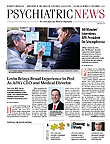September marked the inauguration of APA’s public involvement in the Choosing Wisely campaign—an initiative that encourages physicians, patients, and other health care stakeholders to engage in a dialogue concerning potentially unnecessary medical procedures that, in some instances, could result in harm.
The initiative, sponsored by the American Board of Internal Medicine (ABIM) Foundation, was launched April 2012 with nine physician specialty societies in an effort to move physicians towards better stewardship of health care resources. APA joined the campaign earlier this year.
According to the ABIM Foundation, the current delivery of health care in the United States “contains too much waste”—with consumer organizations reporting as much as 30 percent of delivered care as duplicative or unnecessary in improving patients’ health outcomes.
The Choosing Wisely program requires participating organizations to identify specific tests or procedures that are commonly used but not always essential in their respective fields—APA chose to address the prescription practices of antipsychotic medication.
“Antipsychotic medications have tremendous benefits and improve the quality of life for many people with serious mental illness; however, they carry risks including potentially harmful side effects. Unnecessary use or overuse of antipsychotics can contribute to chronic health problems, such as metabolic, neuromuscular, or cardiovascular problems, in people with serious mental illness,” said Joel Yager, M.D., chair of the APA Council on Quality Care (COQC).
To identify practices that are sometimes deemed as nonessential, a work group of COQC members developed a list of 21 topics that addressed issues from the use of second-generation antipsychotics to routine neuroimaging. More than 100 members from various APA councils—including the Council on Children, Adolescents, and Their Families and the Council on Geriatric Psychiatry—were surveyed to rate topics and ultimately identify the top five items they thought should be addressed. The items were rated on cost, efficacy, and impact on patients’ health.
The final list was approved unanimously by the APA Board of Trustees Executive Committee. The process, from initiation to public release, took nine months.
“APA has recommended that antipsychotics should not be used routinely and should never be used without considerable thought, good clinical reasoning, and discussion with patients as to why under particular circumstances such a course would be preferable to alternative options,” said Yager.
The cautionary principles issued by APA as part of the Choosing Wisely campaign are as follows:
Do not prescribe antipsychotic medications to patients for any indication without appropriate initial evaluation and appropriate ongoing monitoring.
Do not routinely prescribe two or more antipsychotic medications concurrently.
Do not use antipsychotics as the first choice to treat behavioral and psychological symptoms of dementia.
Do not routinely prescribe antipsychotic medications as a first-line intervention for insomnia in adults.
Do not routinely prescribe antipsychotic medications as a first-line intervention for children and adolescents for any diagnosis other than psychotic disorders.
Since the public release of the principles, APA has issued a clarification stating that antipsychotic medication may also be an appropriate first-line option for children and adolescents who have a diagnosis of bipolar disorder and irritability associated with autism spectrum disorder.
“[APA] has shown tremendous leadership by releasing its list of common uses of medication that aren’t always necessary,” stated Richard Baron, M.D., president and CEO of the ABIM Foundation. “The content of this list and all of the others developed through the Choosing Wisely effort are helping physicians and patients across the country engage in conversations about what care they need and what we can do to reduce waste and overuse in our health care system and improve overall health.”
The Choosing Wisely campaign points out that its recommendations are provided solely for informational purposes and should not be used to establish insurance coverage decisions or exclusions. ■

